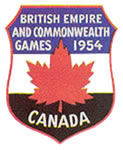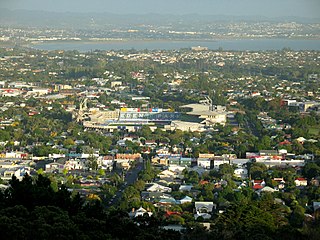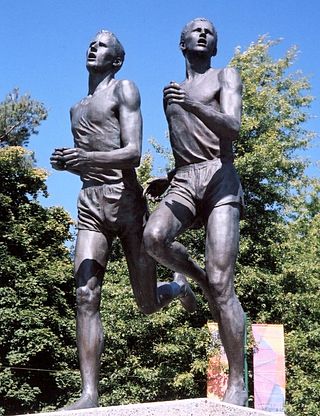| Personal information | ||||||||||||
|---|---|---|---|---|---|---|---|---|---|---|---|---|
| Nationality | ||||||||||||
Medal record
| ||||||||||||
John Milligan, was a Rhodesia and Nyasaland international lawn bowler. [1]
| Personal information | ||||||||||||
|---|---|---|---|---|---|---|---|---|---|---|---|---|
| Nationality | ||||||||||||
Medal record
| ||||||||||||
John Milligan, was a Rhodesia and Nyasaland international lawn bowler. [1]
He won a bronze medal in the fours at the 1962 British Empire and Commonwealth Games in Perth with Malcolm Bibb, Ronnie Turner and Victor Blyth. [2] [3]
He also represented North Rhodesia during the 1954 British Empire and Commonwealth Games.

The Commonwealth Games is a quadrennial international multi-sport event among athletes from the Commonwealth of Nations, which consists mostly, but not exclusively, of territories of the former British Empire. The event was first held in 1930 as the British Empire Games and, with the exception of 1942 and 1946, has successively run every four years since. The event was called the British Empire Games from 1930 to 1950, the British Empire and Commonwealth Games from 1954 to 1966, and the British Commonwealth Games from 1970 to 1974. The event removed the word British from its title for the 1978 Games and has maintained its current name ever since.

The 1934 British Empire Games were the second edition of what is now known as the Commonwealth Games, held in England, from 4–11 August 1934. The host city was London, with the main venue at Wembley Park, although the track cycling events were in Manchester. Seventeen national teams took part, including the Irish Free State.

The 1938 British Empire Games were the third British Empire Games, the event that evolved to become the Commonwealth Games. Held in Sydney, Australia from 5–12 February 1938, they were timed to coincide with Sydney's sesqui-centenary. Venues included the Sydney Cricket Ground, the Sydney Sports Ground, North Sydney Olympic Pool and Henson Park. An estimated 40,000 people attended the opening ceremony. A competitors' residential village was established within the grounds of the Sydney Showground.
No independence before majority rule was a policy adopted by the British government requiring the implementation of majority rule in a colony, rather than rule by the white colonial minority, before the empire granted independence to its colonies. It was sometimes reinterpreted by some commentators as no independence before majority African rule though this addition was not government policy.

The 1954 British Empire and Commonwealth Games were held in Vancouver, British Columbia, from 30 July to 7 August 1954. This was the fifth edition of the event that would eventually become known as the Commonwealth Games, the second post-war Games, the second Canadian Games after the inaugural event in Hamilton and the first event since the name change from British Empire Games took effect in 1952.

The 1958 British Empire and Commonwealth Games were held in Cardiff, Wales, from 18 to 26 July 1958. It was the sixth edition of what would come to be known as the Commonwealth Games, the second Games held in the United Kingdom, and the second held under the name British Empire and Commonwealth Games.

This page shows the all-time medal table for the Commonwealth Games since the first British Empire Games in 1930. The table is updated as of 8 August 2022, the day the 2022 Commonwealth Games in Birmingham ended. These rankings sort by the number of gold medals earned by a country. The number of silvers is taken into consideration next and then the number of bronze. If, after the above, countries are still tied, equal ranking is given and they are listed alphabetically. This follows the system used by the IOC, IAAF and BBC. The source for this data are the tallies listed at the Commonwealth Games Federation's website.
Ian Epton is a former wrestler from Zambia, which was then the British protectorate of Northern Rhodesia.

At the 1950 British Empire Games, the athletics events were held at Eden Park in Auckland, New Zealand in February 1950. A total of 28 athletics events were contested at the Games, 20 by men and 8 by women. A total of seventeen Games records were set or improved over the competition.

At the 1938 British Empire Games, the athletics events were held at the Sydney Cricket Ground in Sydney, Australia in February 1938. A total of 28 athletics events were contested at the Games, 20 by men and 8 by women.
Andrew 'Howard' Payne was an English Olympic track and field athlete. He specialised in the hammer throw event during his career.

At the 1954 British Empire and Commonwealth Games, the athletics events were held at Empire Stadium in Vancouver, British Columbia, Canada in July and August 1954. A total of 29 athletics events were contested at the Games, 20 by men and 9 by women. A total of twenty-four Games records were set or improved over the competition, leaving just five previous best marks untouched. The 1954 edition saw the introduction of the shot put and discus throw for women, as well as the first 4×110 yards relay for women.
Edna Mary Therese Maskell was a hurdler who won the gold medal in the 80 metres hurdles as a competitor for Northern Rhodesia at the 1954 British Empire and Commonwealth Games in Vancouver. Her personal best time was 11.2 seconds. She also won the bronze medal in the 100 yards sprint at 1954 British Empire and Commonwealth Games and finished 10th in the long jump. Previously, she competed at the 1952 Summer Olympics in Helsinki for South Africa, finishing 5th in her heat of the 80 metres hurdles.
The lawn bowls competition at the 1962 British Empire and Commonwealth Games took place at the Dalkeith Bowling Club in Perth, Western Australia from 19 November until 1 December 1962. The bowls competition started several days before the official opening of the Commonwealth Games.
Alan D. Bradley is a former international lawn bowler who competed for Rhodesia.
Terrence Allman Sullivan is a former middle-distance runner. He competed in the men's 1500 metres and 800 metres at the 1960 Summer Olympics, representing Rhodesia. He finished third in the 1962 British Empire and Commonwealth Games 1 mile competing for Rhodesia and Nyasaland. He also participated in the 880 yards in 1962, but was eliminated in the semi-finals. At the 1958 British Empire and Commonwealth Games, representing Southern Rhodesia, he finished fourth in the 880 yards and was eliminated in the heats of the 1 mile.
Abe Bekker is a Zambian former boxer who competed in the flyweight class at the 1954 British Empire and Commonwealth Games in Vancouver and in the bantamweight class at the 1958 British Empire and Commonwealth Games in Cardiff representing Northern Rhodesia. He also represented Rhodesia at the 1960 Summer Olympics in the featherweight division, where he was eliminated in the quarterfinals by Jorma Limmonen of Finland.
Charles Stewart Bradley is a South African-born former international lawn bowler who competed for Rhodesia.
Matthew Malcolm John Bibb, was a Rhodesia and Nyasaland international lawn bowler.
Victor Blyth, was a Rhodesia and Nyasaland international lawn bowler.